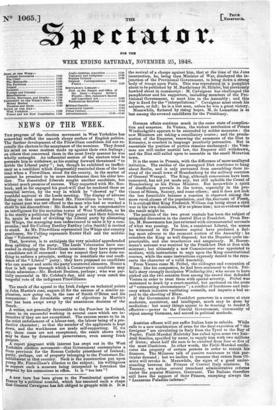NEWS OF THE WEEK.
THE progress of the election movement in West Yorkshire has somewhat ruffled the smooth sleepy surface of English politics. The further development of the Fitzwilliam candidate did not re- concile the electors to the acceptance of the nominee. They found his mind on some matters made up against their own feelings ; an others that concerned them in the most lively manner he was avholly untaught. An influential section of the electors tried to persuade him to withdraw, as his coming forward threatened "to divide the Liberal party" ; but, though he exhibited an ineffici- ency as a candidate which disagreeably reminded them of the last time when a Fitzwilliam stood for the county, in the matter of contest he promised to be more troublesome than his elder bro- ther. The dissatisfied Liberals sought another candidate, but without much promise of success. They coquetted with Mr. Roe- buck, and, so far engaged his good-will that he rendered them an essential service, by the way in which he "showed up" the youthful aspirant at the Leeds meeting. The display of adverse feeling on that occasion forced Mr. Fitzwilliam to retire ; but the vacant post was net offered to the man who had so marked a share in his discomfiture: Mr. Roebuck is of too comprehensive an intelligence for the sectarian towns of West Yorkshire, as he is too sturdy a politician for the Whig gentry and their followers. So, again in dread of dividing the Liberal party by alienating the Whigs, the managing men endeavoured to unite it by a corn- promise ; and Sir Culling Eardley Eardley [dim Smith] is invited to stand. As Mr. Fitzwilliam represented the Whigs and country gentlemen, Sir Culling represents Exeter Hall and the middle- class "Voluntaries."
That, however, is to anticipate the very mischief apprehended from splitting of the party. The Leeds Voluntaries have suc- ceeded in stopping the Fitzwilliam nominee ; they have proposed a candidate not ill esteemed : but we suspect they have done no- thing to enforce a principle, nothing to conciliate the real confi- dence of the " Liberal " party; they have proposed no candidate who can master and unite the party's scattered elements. Hence a door is left open through which a Conservative candidate may obtain admission—Mr. Beckett Denison, perhaps ; who was par- tially successful in Mr. Cobden's day, and may even catch the vengeful vote of the indignant Fitzwilliams.


























